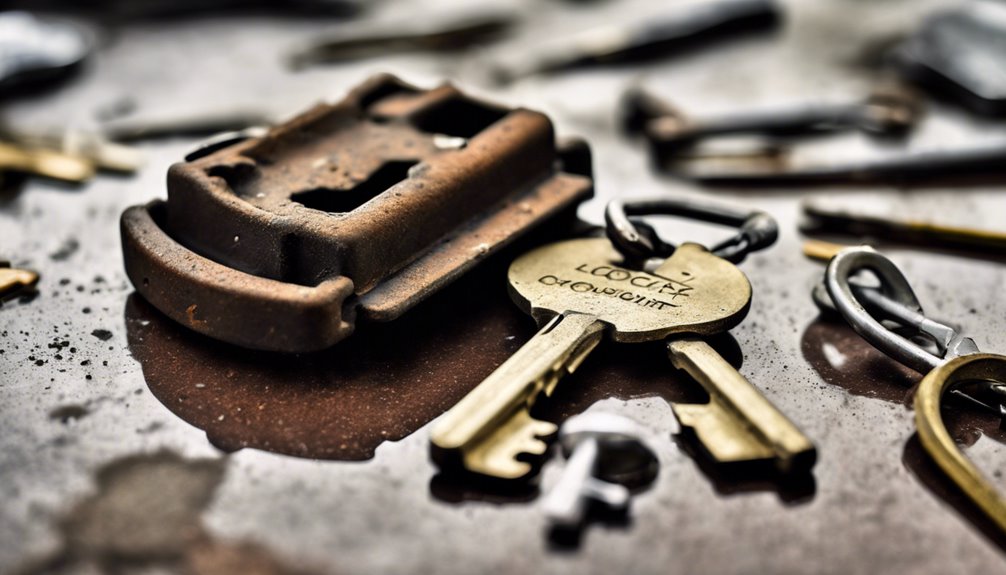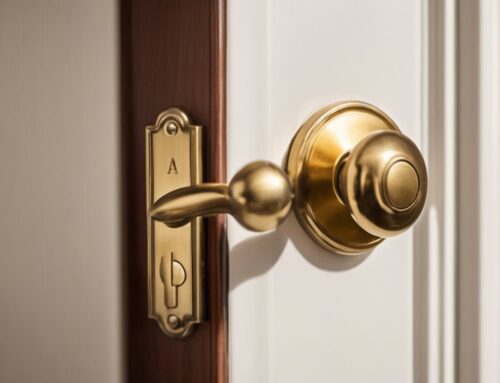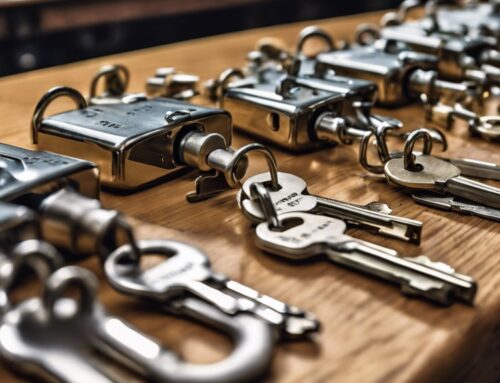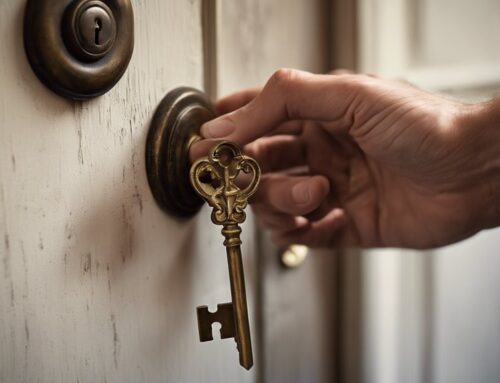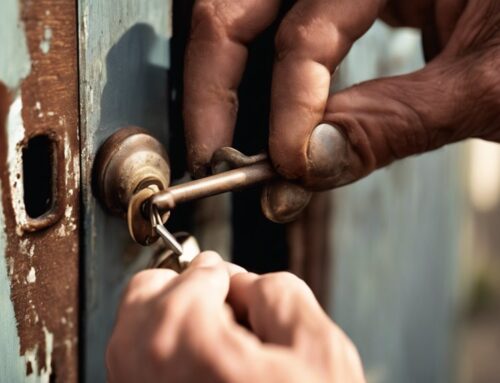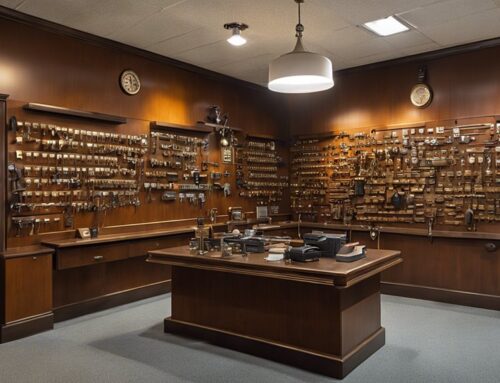Charting the locksmithing landscape can be quite the intricate endeavor. You might not realize that engaging in unauthorized locksmithing in Illinois comes with some serious consequences. It's classified as a Class A misdemeanor, but that's just the beginning. If you're considering practicing without proper licensing, you could face hefty fines and even imprisonment. The implications of these legal bounds not only impact you but also protect consumers. So, what's at stake if you ignore these regulations? Understanding the full picture might change your approach.
Key Takeaways
- Engaging in unauthorized locksmithing is prosecuted as a Class A misdemeanor in Illinois, risking fines and criminal charges.
- Repeat offenses may escalate to Class 4 felonies, leading to increased penalties and potential prison sentences up to three years.
- Fines for unauthorized locksmithing can reach up to $5,000 per occurrence, alongside possible jail time from one to three years.
- Possessing lock picking tools with intent to commit a crime can result in felony charges under 720 ILCS 5/19-2.
- Reporting signs of unauthorized locksmiths, like false contact information or absence of a state license, is crucial for consumer protection.
Licensing Requirements in Illinois
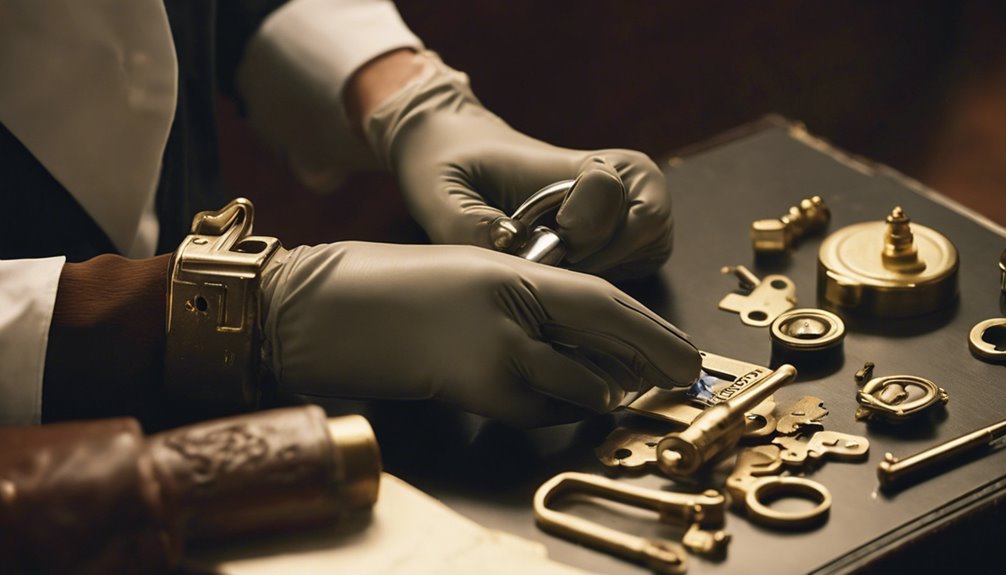
To legally operate as a locksmith in Illinois, you must meet several essential licensing requirements. First, you need to be at least 18 years old, demonstrating that you're capable of handling the responsibilities of the job. Additionally, you must show good moral character, which involves not having any felony convictions in the past 10 years or a dishonorable discharge from the armed forces. Moreover, you must be free from mental health issues and substance abuse problems.
You'll also need to pass an authorized licensing exam, which tests your knowledge of current laws, procedures, and ethics in the locksmithing field. To succeed, you must achieve a passing score of 70 on the exam, which includes 305 multiple-choice and true/false questions. The exam is conducted biannually in March and September, so timing is essential. Compliance with regulations is crucial as ongoing education is required for license renewal to adapt to evolving regulations. Moreover, understanding current industry standards will help ensure your practices remain compliant.
A thorough background check is required, including a fingerprint-based criminal history report. This scrutiny guarantees you pose no risk to the public should you practice locksmithing. You must submit live scan results as part of your application process.
Additionally, maintaining proof of business liability insurance with a minimum coverage of one million dollars is essential. This insurance needs to remain active throughout your licensing period.
Finally, you'll face a $174 application fee, a $50 exam fee, and a $500 fee for the application process, with license renewals occurring every three years. Meeting these regulations not only secures your livelihood but also protects your clients and the community.
Importance of Documentation

While operating as a licensed locksmith is essential for compliance and professionalism, maintaining proper documentation is equally important for safeguarding both your business and your clients. Accurate and thorough documentation helps you meet regulatory requirements, which not only strengthen your business practices but also protect your clients.
Under the Illinois Locksmith Act, you're required to keep detailed records of employee credentials, including their licenses and certifications. Ensuring all employees possess permanent employee registration cards (PERC) or locksmith licenses isn't just smart business; it's a legal necessity. Moreover, grounds for disciplinary sanctions include misrepresentation or failure to maintain documentation, which could lead to severe consequences. In addition, maintaining proper records also helps ensure compliance with essential lock safety standards, reinforcing the security measures you provide to clients.
Documentation doesn't stop with employee information; it extends to your advertising practices as well. Your advertisements must convey accurate details about your business, reflecting your licensed status. Misleading consumers can result in severe penalties, including license revocation.
Finally, keeping track of compliance with state laws—like the Americans with Disabilities Act (ADA)—is equally crucial. Such records support investigations into consumer complaints and help you navigate any allegations against your business.
Consequences of Non-Compliance
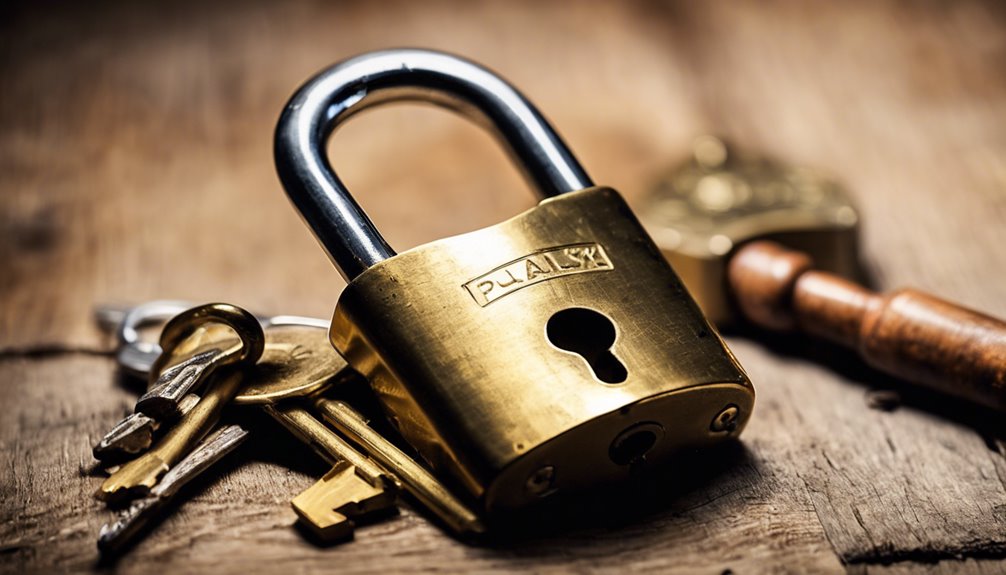
Non-compliance with locksmithing regulations carries serious repercussions that can impact both individuals and businesses. If you engage in unlicensed locksmith work, you risk being prosecuted as a Class A misdemeanor for your first offense, which escalates to a Class 4 felony for subsequent violations. Such consequences can tarnish your reputation and jeopardize your ability to work in the industry. Additionally, in Illinois, legal guidelines specify how locks must be changed in rental properties, making ignorance of such regulations particularly detrimental for locksmiths serving landlords and tenants. Employment laws dictate proper workplace practices, further emphasizing the importance of adhering to regulations.
Your license could also face suspension or revocation, as highlighted in cases involving companies like Price Line and Dependable Locks. Financial penalties add another layer of risk: fines imposed by the court can be substantial, alongside fees necessary for reinstating a suspended license. Moreover, the sunset of licensing in 2029 may lead to an increase in unregulated practices that expose consumers to further risks.
Regulatory actions can involve summarily suspending your license, especially if fraudulent activities or unlicensed personnel are detected. It's crucial to remember that the Department of Financial and Professional Regulation (IDFPR) collaborates with law enforcement to shut down unlicensed operations, leaving you with fewer avenues for business.
You may incur costs from legal proceedings and hearings while dealing with restitution claims from affected customers. Additionally, loss of revenue during license suspension can severely impact your financial viability.
Adhering to compliance requirements is critical, as failure to do so will prevent you from obtaining a new license or establishing a new business.
In light of these factors, it's evident that the consequences of non-compliance in locksmithing can be profound and far-reaching. Respecting licensing regulations not only protects you but also fosters trust in the professional locksmithing industry.
Understanding Unlawful Lock Picking
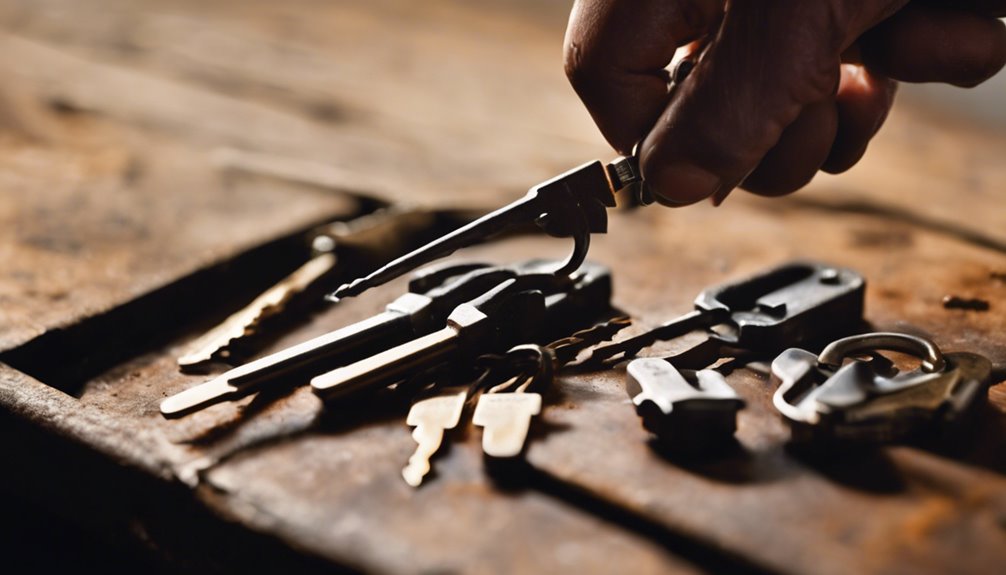
Understanding Unlawful Lock Picking
How does unlawful lock picking intersect with legal statutes? In Illinois, unlawful lock picking is tightly regulated under Section 720 ILCS 5/19-2. This statute criminalizes the possession of lock picking tools, specifically when there's intent to commit a felony or theft. It isn't merely about the tools; it's about your intent behind possessing them.
Here's a breakdown of important aspects concerning unlawful lock picking:
| Aspect | Details | Legal Consequences |
|---|---|---|
| Definition | Tools designed for breaking into secured structures | Possession with intent results in a felony |
| Covered Structures | Buildings, vehicles, watercraft, etc. | Specific structures defined by the law |
| Intent Requirement | Must intend to commit a crime | Lack of intent can be a defense |
| Penalties | Class 4 felony with up to 3 years in prison | Fines can reach up to $25,000 |
| Professional Exceptions | Locksmiths & law enforcement | Legal possession for legitimate purposes |
Understanding these elements is essential. The law differentiates between unlawful possession with malicious intent and lawful ownership for legitimate purposes. Additionally, landlords in Illinois have specific rights regarding rekeying that must be adhered to, as violations can lead to legal complications. Be mindful: even accidental possession can lead to serious repercussions if you lack proper justification. If you face such allegations, consulting legal professionals is important to navigate the complexities of intent and establish a solid defense. Additionally, it is wise to be aware of what is legally allowed for lock picking in the state to avoid potential legal trouble.
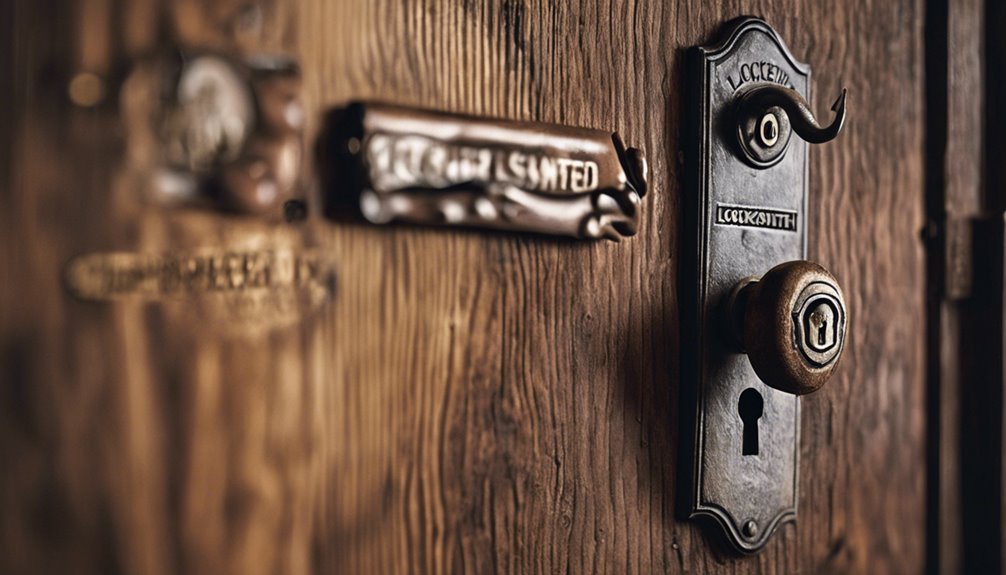
Unauthorized locksmiths pose a significant threat to both personal security and consumer trust. When you encounter an unauthorized locksmith, acting promptly is essential to mitigate the risk they present.
The Illinois Department of Financial and Professional Regulation (IDFPR) provides a clear process for reporting these unlawful operators. To report an unauthorized locksmith, visit the IDFPR website. Start by finding your way to the "Help Center" and then click on "File a Complaint." Under the "Professional Regulation" section, you'll find the option to submit your complaint through an online form. Your submission will be reviewed by the IDFPR board, which conducts a thorough assessment before an administrative law judge evaluates any necessary reprimands or fines. Additionally, it's vital for locksmiths to adhere to ADA compliance standards to maintain ethical operations in the field.
It's important to identify unauthorized locksmiths to protect yourself and others. Look out for companies with multiple false addresses and phone numbers. Always check for a state license number displayed on their vehicles, advertising, and any paperwork they provide. If a locksmith doesn't present their identity card, which should indicate state approval, exercise caution.
Significant discrepancies between the initial quote and the final charges may signal deceitful practices, and be wary of operators without liability insurance. Protect your freedom and your community by remaining vigilant. Save the contact information of reputable locksmiths for emergencies, verify credentials before service, and use secure payment methods like credit cards. In certain situations, you might also need to consider the role that locksmiths play in eviction processes to ensure the legality of their actions.
If you encounter fraudulent behavior, don't hesitate to inform consumer protection hotlines regarding unethical conduct. Your proactive steps can help maintain safety for all.
Role of IDFPR in Enforcement

While the enforcement of locksmith regulations is essential for guaranteeing consumer safety, the Illinois Department of Financial and Professional Regulation (IDFPR) plays a pivotal role in this process. The IDFPR investigates complaints related to illegal or unprofessional conduct among locksmiths, guaranteeing compliance with the Private Detective, Private Alarm, Private Security, and Locksmith Act of 2004. Their thorough investigations can lead to official actions when violations are discovered, reinforcing the importance of adherence to established standards.
The department checks for valid licenses and employee registration cards (PERC) to confirm that locksmiths are operating within legal parameters. Unlicensed operations aren't taken lightly; they can face prosecution and potentially severe penalties. IDFPR collaborates with law enforcement agencies to dismantle fraudulent locksmith businesses, demonstrating its commitment to public safety.
Licensing and registration are rigorous and involve exams, background checks, and fees that can reach $300. Non-compliance can result in concise license suspensions, preventing agencies from conducting business under various names until conditions are satisfied. For unlicensed locksmith work, the consequences escalate from misdemeanors to felonies based on repeat offenses.
Moreover, IDFPR prioritizes educating consumers about identifying licensed locksmiths. By creating resources and public awareness campaigns, it empowers individuals to make informed decisions, minimizing the risk of fraud. Additionally, locksmiths are required to stay updated on the evolving regulations concerning digital and smart locks to ensure they remain compliant and effectively serve their clients.
The proactive and stringent actions of IDFPR guarantee accountability within the locksmith industry, safeguarding public interests.
Legal Implications of Violations

Legal implications of violations in the locksmithing industry can be severe, especially when individuals or businesses disregard licensing requirements. Engaging in unauthorized locksmithing not only risks your business's reputation but also exposes you to significant legal repercussions.
Understanding these implications is vital if you value your freedom to operate within the law.
Here are key legal consequences you may face:
- License Suspension and Revocation: If you're found using unlicensed personnel or providing false license information, your license could be suspended or permanently revoked.
- Criminal Charges and Fines: The first offense may result in a Class A misdemeanor, while repeat offenses could escalate to a Class 4 felony. Fines can accumulate to $5,000 per occurrence, and jail time may range from one to three years.
- Employment Restrictions: Employing unlicensed staff is prohibited, and you're required to maintain a register of licensed personnel. Violations can lead to additional penalties.
These legal implications are designed to protect both consumers and the integrity of the locksmithing profession.
If you operate outside the law, not only do you face fines and possible imprisonment, but you also jeopardize your business's future. Staying informed and compliant with licensing requirements is essential for safeguarding your rights and ensuring your entrepreneurial freedom isn't curtailed by avoidable legal troubles.
Frequently Asked Questions
Can I Legally Perform Locksmith Services Without a License in Illinois?
No, you can't legally perform locksmith services without a license in Illinois.
The state mandates that all locksmiths acquire a valid license, which involves passing an exam and a criminal background check.
Operating without this license could lead to citations, fines, and potential business shutdown.
Adhering to these regulations is essential for ensuring both your freedom to work and compliance with the law, so make sure you've got the necessary credentials before proceeding.
When it comes to unauthorized locksmithing, tools like lock picks, bump keys, and devices for tampering with locks can be deemed illegal.
If you possess burglary tools with the intent to commit a crime, you're crossing a legal line.
Additionally, owning false keys or criminal instruments, specifically made for illegal activities, falls into this category.
Keeping these tools out of public view may also indicate intent, further complicating your legal standing.
How Can I Identify a Licensed Locksmith in Illinois?
Finding a licensed locksmith in Illinois is like hunting for a needle in a haystack, but it's crucial for your peace of mind.
First, check the Illinois Department of Financial and Professional Regulation's website to verify their license status. Look for a certificate displayed in their shop or ask about their liability insurance.
Be wary of unlicensed individuals; ensuring they're registered protects you from scams and shoddy work. Trust only the legitimate keys to your security!
What Should I Do if a Locksmith Refuses to Show Their License?
If a locksmith refuses to show their license, you should take immediate action.
First, politely insist on seeing their license, as it's your right to verify their credentials.
If they still refuse, document the encounter with details like their name and business information.
Next, report the incident to the Illinois Department of Financial and Professional Regulation.
Keeping a record of your interactions is essential for any future complaints or concerns.
Are There Exceptions for DIY Lock Picking in Emergencies?
Imagine a child trapped in a sweltering car on a hot day, desperation hanging in the air.
In emergencies, DIY lock picking might seem tempting but be cautious. While you might be driven by instinct, legality hinges on intent. If you lack clear permission to enter, you risk serious penalties.
Law enforcement can assist, but for non-emergencies, it's best to call a locksmith. Always prioritize safety and legality in urgent situations.
Conclusion
In traversing the world of locksmithing in Illinois, understanding and adhering to licensing regulations is essential. Think of the law as a sturdy lock; breaches create vulnerabilities that can lead to serious consequences. By ensuring you're compliant, you protect not just your business but also the consumers' trust in the profession. Stay informed and report any unauthorized activities to uphold the integrity of locksmithing—doing so helps maintain a secure environment for everyone involved.

